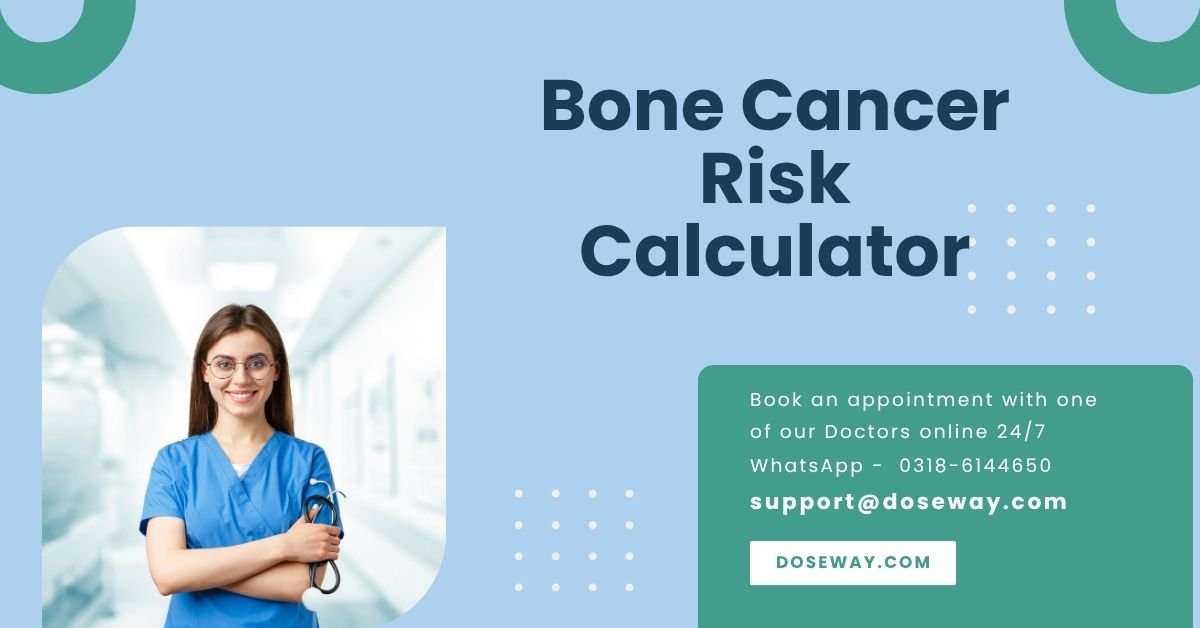Bone Cancer Risk Assessment
Complete this comprehensive assessment to evaluate your risk of developing bone cancer based on clinical factors and personal health history
Your Bone Cancer Risk Assessment
Interpretation of Results
Your calculated bone cancer risk is low. This assessment is based on your demographic information, medical history, and specific bone health factors.
A score below 20% indicates low risk, 20-50% indicates moderate risk, and above 50% indicates high risk. This tool provides an estimate and should not replace consultation with a healthcare professional.
Personalized Recommendations
- Maintain regular physical activity with weight-bearing exercises
- Ensure adequate calcium and vitamin D intake through diet or supplements
- Schedule regular check-ups with your healthcare provider
- Avoid tobacco products and limit alcohol consumption
- Discuss any concerning symptoms such as persistent bone pain with your doctor
Try More Free Tools:
- Try Our Leukemia Risk Calculator – Lymphoma Risk Calculator
- Try Our Head & Neck Cancer Risk Calculator
- Try Our Gallbladder Cancer Risk Calculator
Bone Cancer Risk Calculator

Table Of Contents
Bone Cancer Risk Assessment
Bone cancer is a rare but serious condition that can develop in any bone in the body. Early detection and risk assessment are crucial for better outcomes. Our Bone Cancer Risk Calculator helps you evaluate potential risk factors based on medical history, lifestyle, and symptoms.
This tool calculates your risk score by analyzing key factors such as:
- Genetic predispositions
- Previous radiation exposure
- Lifestyle habits
- Symptom severity
Understanding your risk can help you take preventive measures and consult a doctor if needed.
Understanding Bone Cancer: Key Terms & Definitions
1. What Is Bone Cancer?
Bone cancer occurs when abnormal cells grow uncontrollably in bone tissue. It can be:
- Primary bone cancer (originates in the bone)
- Secondary/metastatic bone cancer (spreads from other organs)
2. Common Types of Bone Cancer
| Type | Description |
|---|---|
| Osteosarcoma | Most common in children/teens, affects long bones |
| Chondrosarcoma | Develops in cartilage, usually in adults |
| Ewing Sarcoma | Aggressive, often in pelvis or long bones |
| Metastatic Bone Cancer | Spreads from breast, prostate, or lung cancer |
3. Risk Factors for Bone Cancer
Our calculator evaluates these critical risk factors:
A. Genetic & Medical History Factors
- Paget’s disease of bone (increases bone cancer risk)
- Li-Fraumeni syndrome (genetic disorder)
- Previous radiation therapy (especially in childhood)
- Family history of bone cancer
B. Symptoms & Warning Signs
- Persistent bone pain (worsens at night)
- Swelling or lumps near bones
- Unexplained fractures
- Fatigue & weight loss
C. Lifestyle & Environmental Risks
- Smoking & alcohol consumption
- Sedentary lifestyle & obesity
- Exposure to radiation/chemicals
How Our Bone Cancer Risk Calculator Works
Step 1: Enter Your Demographic & Medical Details
- Age & Gender (some bone cancers are age/gender-specific)
- Family history (genetic risks)
- Previous cancer treatments
Step 2: Report Symptoms (If Any)
- Pain duration & severity (slider-based input)
- Swelling, fractures, or fatigue
Step 3: Lifestyle & Environmental Factors
- Smoking & alcohol habits
- Physical activity level
- Occupational hazards
Step 4: Get Your Risk Score & Interpretation
After submission, the calculator provides:
✅ Risk Score (0-100) – Color-coded (Green/Yellow/Red)
✅ Personalized Recommendations
✅ Downloadable PDF Report
Understanding Your Bone Cancer Risk Results
1. Low Risk (0-30%)
- Interpretation: Minimal risk factors detected.
- Recommendations:
- Maintain regular check-ups
- Follow a healthy lifestyle
2. Moderate Risk (30-60%)
- Interpretation: Some concerning factors present.
- Recommendations:
- Consult a doctor for further screening
- Reduce modifiable risks (smoking, alcohol)
3. High Risk (60-100%)
- Interpretation: Elevated risk—medical consultation advised.
- Recommendations:
- Seek immediate medical evaluation
- Consider genetic testing if family history exists
Why Use a Bone Cancer Risk Calculator?
- Early Detection: Identifies warning signs before symptoms worsen.
- Personalized Insights: Tailored recommendations based on your inputs.
- Preventive Guidance: Helps reduce risk factors through lifestyle changes.
Final Thoughts
Early risk assessment is key to managing bone health. Use our Free Bone Cancer Risk Calculator to evaluate your risk and take proactive steps toward prevention.
🔗 Try the calculator now and download your personalized report!
FAQs
How accurate is this bone cancer risk calculator?
This tool provides an estimate based on known risk factors but is not a diagnostic tool. Always consult a doctor for medical advice.
Can lifestyle changes reduce bone cancer risk?
Yes! Maintaining a healthy weight, avoiding smoking, and limiting alcohol can help.
Should I worry if my score is high?
A high score doesn’t mean you have cancer, but it suggests you should see a doctor for further evaluation.

 Cart is empty
Cart is empty
Add a Comment